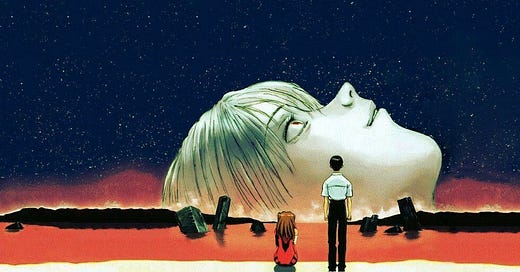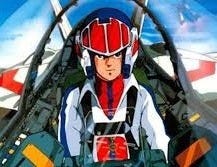To Every Generation Their Anime: Neon Genesis Evangelion, Robotech and Me
Being quick thoughts on what watching a disjointed cartoon in my parents basement when I was a kid might have done to my brain.
If you follow as many unhinged twitter accounts as I do, you run into a lot of anime. The urtext, especially for the folks into the stuff I’m into (i.e. AI, rationalism, weirder fringes of EA) seems to be Neon Genesis Evangelion, a 1990s era anime.
I asked GPT to described it in one paragraph and it wrote:
Neon Genesis Evangelion is a groundbreaking Japanese anime series that follows a group of teenagers, led by 14-year-old Shinji Ikari, who are recruited to pilot massive bio-mechanical robots called Evangelions to protect Earth from mysterious beings known as "Angels." Set in a post-apocalyptic world recovering from a cataclysmic event, the series explores themes of identity, isolation, and trauma as the young pilots confront not only terrifying external threats but also their own inner struggles and psychological battles. As the story unfolds, it dives deep into existential and philosophical questions, blending intense action with profound psychological depth, and challenging traditional anime tropes, leaving a lasting impact on the medium and its audience.
In order to understand the minds of the people creating our future, I tried to watch NGE. I couldn’t get through the first episode. Too confusing, too childish, not for me.
Sorry not sorry.
I did read Julie Muncy great essay on the show and it’s influence in Wired. Here’s part of why she thinks its so resonant:
While firmly situated in an anime tradition of art about the horrors of war, giant robots, and young heroes, it is distinctive in its moment in anime history for the way it eventually abandons most facets of its own premise to turn its attention entirely inward. Creator Hideaki Anno famously suffered from crippling depression while working on the series, and that is ultimately what Neon Genesis Evangelion ends up being about: the horrors of the human mind, tinged with concepts borrowed from Freud and Jung, decorated with imagery that borrows as much from anime's past as it does from Kabbalistic and Gnostic Christian traditions.
If you make it all the way through NGE, let me know if you think she’s right.
For me, thinking about NGE and its influence on a whole world of very online folks reminded me of my own childhood anime obsession, Robotech.
GPT summarizes Robotech as:
A classic sci-fi anime series that follows humanity’s struggle to defend Earth against alien invasions, using advanced technology derived from a crashed alien spaceship. The story spans multiple generations and unfolds over three main sagas, each dealing with a different alien threat. In the first saga, the crew of the SDF-1 (the space fortress) battles the giant Zentraedi warriors; in the second, Earth faces the Robotech Masters; and in the third, the human resistance confronts the insect-like Invid. Throughout these conflicts, humanity’s hope lies in transforming technology, known as “Robotechnology,” enabling powerful fighter jets and mechs to combat overwhelming alien forces. The series is known for its complex characters, blending romance, war, and high-stakes drama, with themes of love, sacrifice, and survival under constant threat of extinction.
This clear description elides how truly strange the show was.
American producers had cobbled together footage from three different anime shows, cutting them together and adding in English dubs to create a new plot that was, at best, confusing, especially when you watched it, as I did, at age ten, on your parents shitty little TV, alone, at six in the morning. It didn’t help that I’d never heard of anime, had barely even heard of Japan, had no reference for the post WWII psychology that permeated anime of this era, and was both confused and fascinated by the teenage romance that was flourishing amidst the largely disjointed plot about space robot warfare.
Despites its many drawbacks, Robotech was a formative text for me. Sparking a love of science fiction that I have to this day, beginning my life long interest in the weird and kinda inscrutable, and helping to make me fascinated and excited about our weird, disjointed future.
Maybe NGE serves the same purpose for younger folks building and thinking about our strange future, giving them a narrative that shows the very human drama of love, humor and trauma in a world of robots battling techno demons. Or maybe not, I’m not sure.





